- Colorado attorney general says state's prohibition on same-sex marriages remains
- Utah decision is the first of its kind by an appeals court on the hot-button issue
- The state will appeal the decision directly to the Supreme Court
- Same-sex marriage is legal in the District of Columbia and 19 states
(CNN) -- In a significant first, a U.S. appeals court has struck down a state ban on same-sex marriage, creating greater political and legal momentum for the Supreme Court to decide whether gays and lesbians have a constitutional right to wed.
It happened on Wednesday in Utah, where a panel ruled 2-1 against the prohibition, saying that any couple, regardless of sexual orientation, has the right to marry. Enforcement of the decision was stayed temporarily.
"We hold that the Fourteenth Amendment protects the fundamental right to marry, establish a family, raise children, and enjoy the full protection of a state's marital laws," the majority opinion from the 10th Circuit U.S. Court of Appeals said.
"A state may not deny the issuance of a marriage license to two persons, or refuse to recognize their marriage, based solely upon the sex of the persons in the marriage union," the court said.
Utah Attorney General Sean Reyes said his office would appeal to the Supreme Court. The justices then would decide whether to hear the case.
Derek Kitchen, a key plaintiff in the case along with his partner, Moudi Sbeity, said they were "overjoyed" by the ruling.

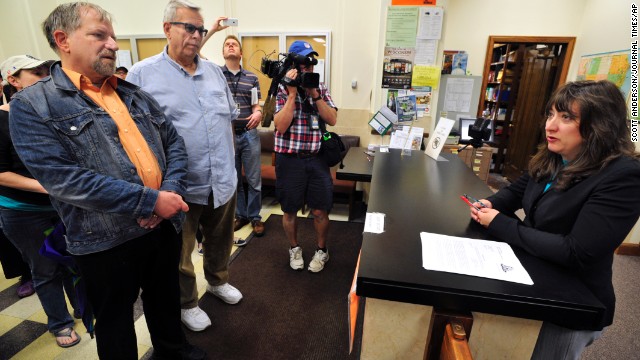 The Rev. Tony Larsen and his partner, Craig Matheus, are refused a marriage license by Racine County Clerk Wendy Christensen, right, in the clerk's office in Racine, Wisconsin, on Friday, June 13. The county does not grant marriage licenses to same-sex couples despite a judge's ruling that the state ban on gay marriage is unconstitutional.
The Rev. Tony Larsen and his partner, Craig Matheus, are refused a marriage license by Racine County Clerk Wendy Christensen, right, in the clerk's office in Racine, Wisconsin, on Friday, June 13. The county does not grant marriage licenses to same-sex couples despite a judge's ruling that the state ban on gay marriage is unconstitutional. 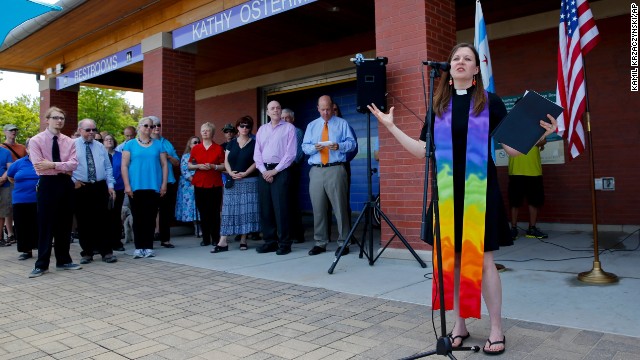 Pastor Carol Hill from Epworth United Methodist Church speaks during a beachfront marriage equality ceremony at the Kathy Osterman Beach in Chicago, on Sunday, June 1, 2014. June 1 marked the first day that all of Illinois' 102 counties could begin issuing marriage licenses to same-sex couples.
Pastor Carol Hill from Epworth United Methodist Church speaks during a beachfront marriage equality ceremony at the Kathy Osterman Beach in Chicago, on Sunday, June 1, 2014. June 1 marked the first day that all of Illinois' 102 counties could begin issuing marriage licenses to same-sex couples. 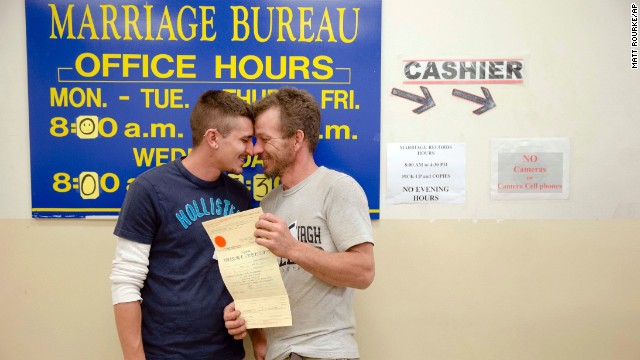 William Roletter, left, and Paul Rowe, right, press close to one another after having their photo taken with their newly acquired marriage certificate at City Hall in Philadelphia, Pennsylvania, on May 21.
William Roletter, left, and Paul Rowe, right, press close to one another after having their photo taken with their newly acquired marriage certificate at City Hall in Philadelphia, Pennsylvania, on May 21. 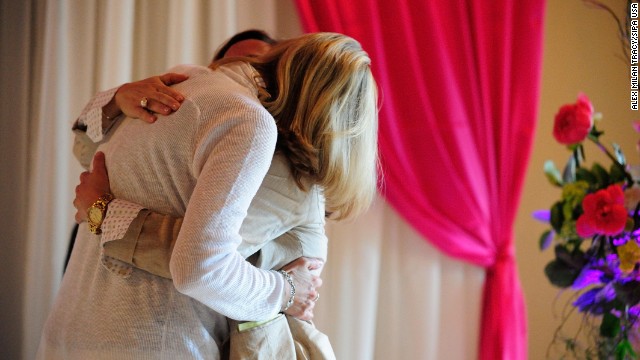 Julie Engbloom, left, and Laurie Brown embrace after being wed in Portland, Oregon, on Monday, May 19, after a federal judge struck down the state's voter-approved ban on same-sex marriage.
Julie Engbloom, left, and Laurie Brown embrace after being wed in Portland, Oregon, on Monday, May 19, after a federal judge struck down the state's voter-approved ban on same-sex marriage. 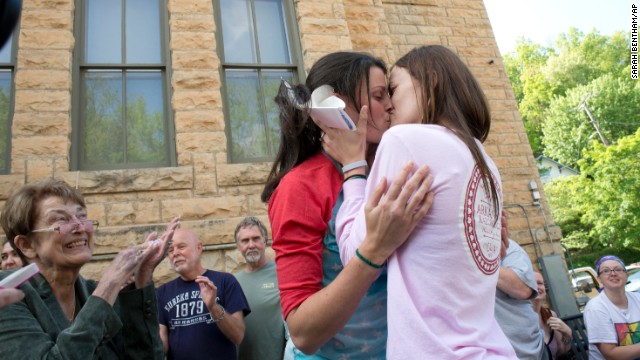 Jennifer Rambo, right, kisses her partner, Kristin Seaton, after their marriage ceremony in front of the Carroll County Courthouse in Eureka Springs, Arkansas, on Saturday, May 10. At left is Sheryl Maples, the lead attorney who filed the Wright v. State of Arkansas lawsuit. Rambo and Seaton were the first same-sex couple to be granted a marriage license in Eureka Springs after a judge overturned Amendment 83, which banned same-sex marriage in the state of Arkansas.
Jennifer Rambo, right, kisses her partner, Kristin Seaton, after their marriage ceremony in front of the Carroll County Courthouse in Eureka Springs, Arkansas, on Saturday, May 10. At left is Sheryl Maples, the lead attorney who filed the Wright v. State of Arkansas lawsuit. Rambo and Seaton were the first same-sex couple to be granted a marriage license in Eureka Springs after a judge overturned Amendment 83, which banned same-sex marriage in the state of Arkansas. 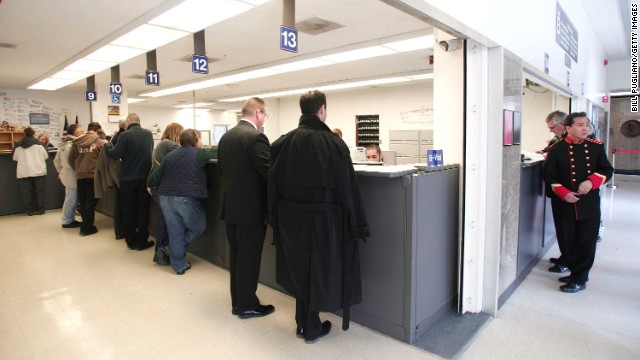 Same-sex couples get their marriage licenses at the Oakland County Courthouse in Pontiac, Michigan, on Saturday, March 22, a day after a federal judge overturned Michigan's ban on same-sex marriage.
Same-sex couples get their marriage licenses at the Oakland County Courthouse in Pontiac, Michigan, on Saturday, March 22, a day after a federal judge overturned Michigan's ban on same-sex marriage. 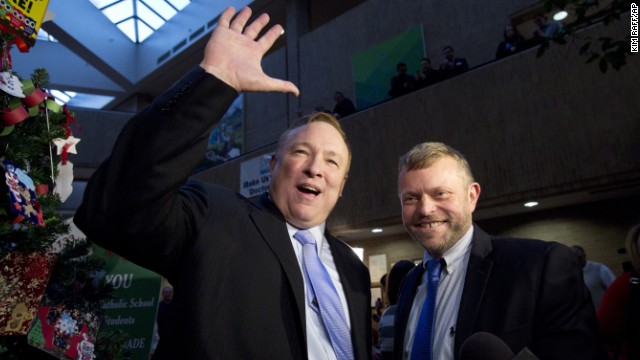 Utah state Sen. Jim Dabakis, left, and Stephen Justesen acknowledge the crowd after being married in Salt Lake City on Friday, December 20. A federal judge struck down Utah's ban on same-sex marriage, saying it conflicted with the constitutional guarantees of equal protection and due process. Many Utah counties began issuing marriage licenses before the state appealed to the U.S. Supreme Court. The high court temporarily blocked enforcement of the lower court ruling until the constitutional questions are fully resolved.
Utah state Sen. Jim Dabakis, left, and Stephen Justesen acknowledge the crowd after being married in Salt Lake City on Friday, December 20. A federal judge struck down Utah's ban on same-sex marriage, saying it conflicted with the constitutional guarantees of equal protection and due process. Many Utah counties began issuing marriage licenses before the state appealed to the U.S. Supreme Court. The high court temporarily blocked enforcement of the lower court ruling until the constitutional questions are fully resolved. 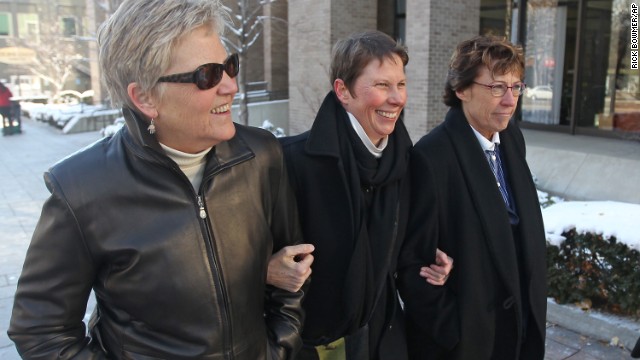 Plaintiffs Laurie Wood, left, and Kody Partridge, center, and attorney Peggy Tomsic leave a federal courthouse in Salt Lake City on Wednesday, December 4, after a judge heard arguments challenging Utah's same-sex marriage ban.
Plaintiffs Laurie Wood, left, and Kody Partridge, center, and attorney Peggy Tomsic leave a federal courthouse in Salt Lake City on Wednesday, December 4, after a judge heard arguments challenging Utah's same-sex marriage ban. 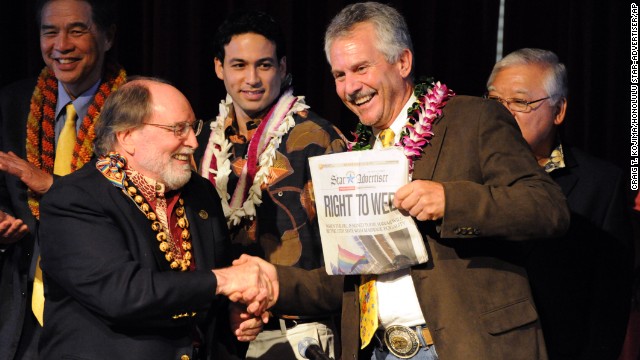 Hawaiian Gov. Neil Abercrombie, left, and former Sen. Avery Chumbley celebrate with a copy of the Star-Advertiser after Abercrombie signed a bill legalizing same-sex marriage in Hawaii on Wednesday, November 13, in Honolulu. Hawaii's same-sex marriage debate began in 1990, when two women applied for a marriage license, leading to a court battle and a 1993 state Supreme Court decision that their rights to equal protection were violated by not letting them marry. Now the state is positioning itself for an increase in tourism as visitors arrive to take advantage of the law, which took effect December 2.
Hawaiian Gov. Neil Abercrombie, left, and former Sen. Avery Chumbley celebrate with a copy of the Star-Advertiser after Abercrombie signed a bill legalizing same-sex marriage in Hawaii on Wednesday, November 13, in Honolulu. Hawaii's same-sex marriage debate began in 1990, when two women applied for a marriage license, leading to a court battle and a 1993 state Supreme Court decision that their rights to equal protection were violated by not letting them marry. Now the state is positioning itself for an increase in tourism as visitors arrive to take advantage of the law, which took effect December 2. 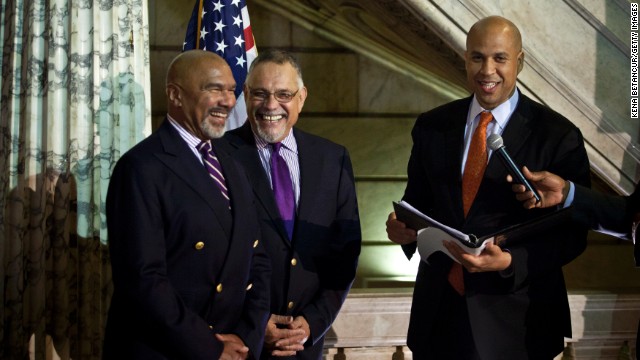 Newark, New Jersey, Mayor Cory Booker officiates a wedding ceremony for Joseph Panessidi and Orville Bell at City Hall on Monday, October 21. The state Supreme Court denied the state's request to prevent same-sex marriages temporarily, clearing the way for same-sex couples to marry.
Newark, New Jersey, Mayor Cory Booker officiates a wedding ceremony for Joseph Panessidi and Orville Bell at City Hall on Monday, October 21. The state Supreme Court denied the state's request to prevent same-sex marriages temporarily, clearing the way for same-sex couples to marry. 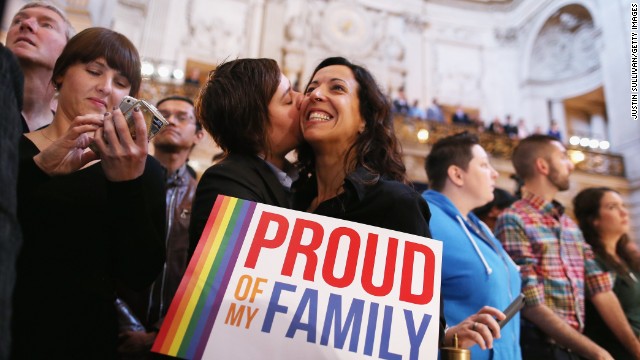 A couple celebrates at San Francisco City Hall upon hearing about the U.S. Supreme Court rulings on same-sex marriage on June 26, 2013. The high court cleared the way for same-sex couples in California to resume marrying after dismissing an appeal on Proposition 8 on jurisdictional grounds.
A couple celebrates at San Francisco City Hall upon hearing about the U.S. Supreme Court rulings on same-sex marriage on June 26, 2013. The high court cleared the way for same-sex couples in California to resume marrying after dismissing an appeal on Proposition 8 on jurisdictional grounds. 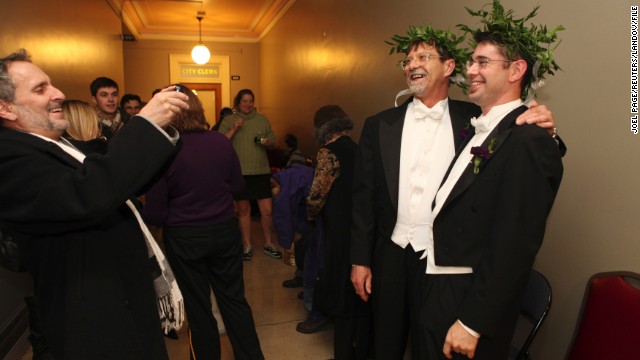 In the other June 26 ruling, the Supreme Court struck down a key part of the Defense of Marriage Act, a 1996 federal law defining marriage as between a man and a woman. Jamous Lizotte, right, and Steven Jones pose for photos while waiting for a marriage license in Portland, Maine, in December 2012.
In the other June 26 ruling, the Supreme Court struck down a key part of the Defense of Marriage Act, a 1996 federal law defining marriage as between a man and a woman. Jamous Lizotte, right, and Steven Jones pose for photos while waiting for a marriage license in Portland, Maine, in December 2012. 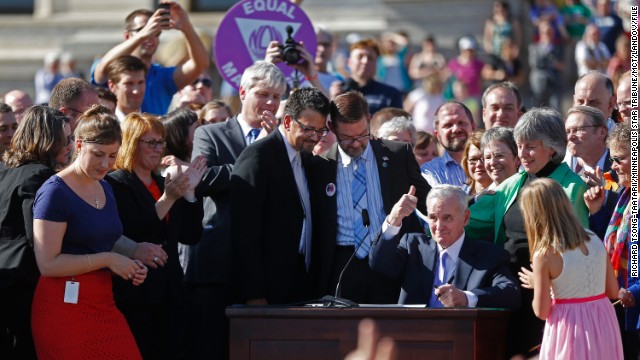 At the state Capitol in St. Paul, Minnesota on May 14, 2013, Gov. Mark Dayton signs a bill legalizing same-sex marriage.
At the state Capitol in St. Paul, Minnesota on May 14, 2013, Gov. Mark Dayton signs a bill legalizing same-sex marriage.  Delaware Gov. Jack Markell holds up legislation on May 7, 2013, allowing same-sex couples to wed in the state.
Delaware Gov. Jack Markell holds up legislation on May 7, 2013, allowing same-sex couples to wed in the state. 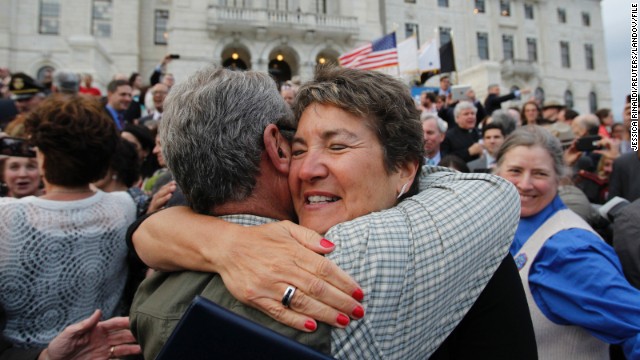 Rhode Island state Sen. Donna Nesselbush, right, embraces a supporter after the Marriage Equality Act was signed into law at the statehouse in Providence on May 2, 2013.
Rhode Island state Sen. Donna Nesselbush, right, embraces a supporter after the Marriage Equality Act was signed into law at the statehouse in Providence on May 2, 2013. 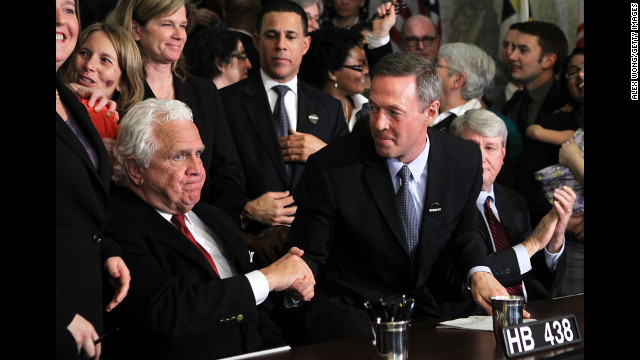 Maryland Gov. Martin O'Malley, center, shakes hands with Senate President Thomas V. "Mike" Miller after signing a same-sex marriage bill on March 1, 2012. The law was challenged, but voters approved marriage equality in a November 2012 referendum.
Maryland Gov. Martin O'Malley, center, shakes hands with Senate President Thomas V. "Mike" Miller after signing a same-sex marriage bill on March 1, 2012. The law was challenged, but voters approved marriage equality in a November 2012 referendum. 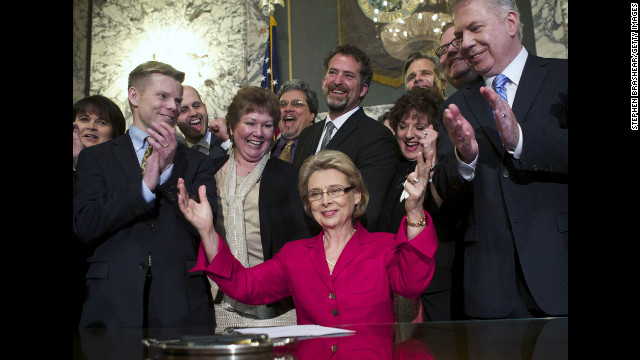 Washington Gov. Chris Gregoire celebrates after signing marriage equality legislation into law on February 13, 2012. Voters there approved same-sex marriage in November 2012.
Washington Gov. Chris Gregoire celebrates after signing marriage equality legislation into law on February 13, 2012. Voters there approved same-sex marriage in November 2012.  Phyllis Siegel, 76, right, kisses her wife, Connie Kopelov, 84, after exchanging vows at the Manhattan City Clerk's office with New York City Council Speaker Christine C. Quinn in attendance on July 24, 2011, the first day New York state's Marriage Equality Act went into effect.
Phyllis Siegel, 76, right, kisses her wife, Connie Kopelov, 84, after exchanging vows at the Manhattan City Clerk's office with New York City Council Speaker Christine C. Quinn in attendance on July 24, 2011, the first day New York state's Marriage Equality Act went into effect. 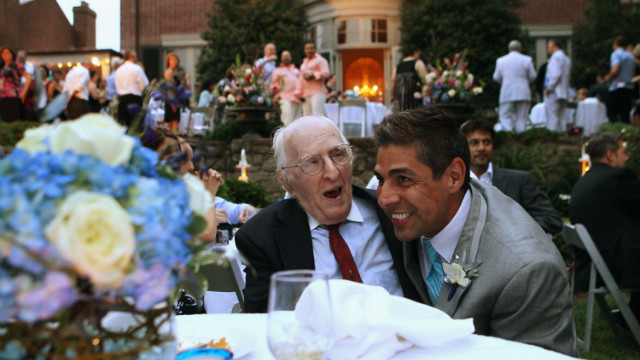 In 2010, television reporter Roby Chavez, right, shares a moment with gay rights activist Frank Kameny during Chavez and Chris Roe's wedding ceremony in the nation's capital. Same-sex marriage became legal in Washington on March 9, 2010.
In 2010, television reporter Roby Chavez, right, shares a moment with gay rights activist Frank Kameny during Chavez and Chris Roe's wedding ceremony in the nation's capital. Same-sex marriage became legal in Washington on March 9, 2010. 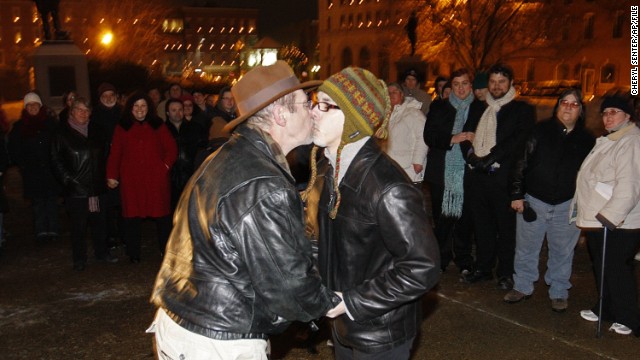 Olin Burkhart, left, and Carl Burkhart kiss on the steps of the New Hampshire Capitol in Concord in January 2010 as the state's law allowing same-sex marriage goes into effect.
Olin Burkhart, left, and Carl Burkhart kiss on the steps of the New Hampshire Capitol in Concord in January 2010 as the state's law allowing same-sex marriage goes into effect. 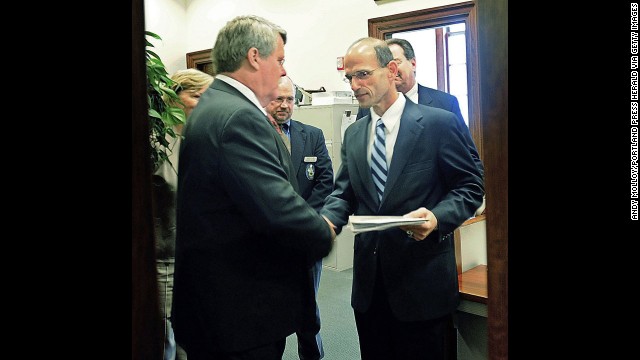 Maine state Sen. Dennis Damon left, hands Gov. John Baldacci the bill that the state Senate passed to affirm the right for same-sex couples to marry on May 6, 2009.
Maine state Sen. Dennis Damon left, hands Gov. John Baldacci the bill that the state Senate passed to affirm the right for same-sex couples to marry on May 6, 2009. 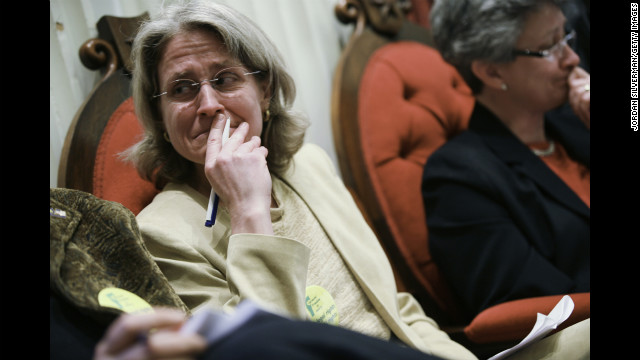 Beth Robinson of the Vermont Freedom to Marry Task Force, who is among those who fought for marriage equality, on April 7, 2009.
Beth Robinson of the Vermont Freedom to Marry Task Force, who is among those who fought for marriage equality, on April 7, 2009. 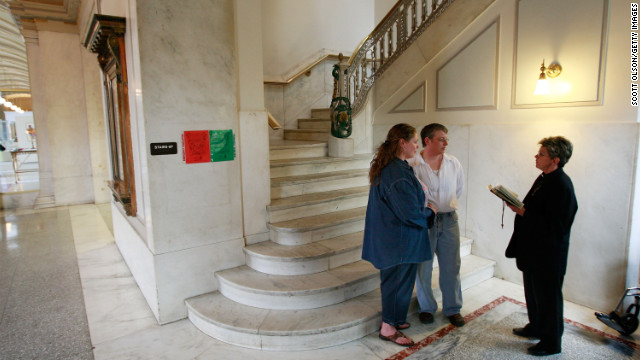 Amy Klein-Matheny, left, and her wife, Jennifer, exchange vows in Iowa after same-sex couples were allowed to marry there with a court ruling on April 3.
Amy Klein-Matheny, left, and her wife, Jennifer, exchange vows in Iowa after same-sex couples were allowed to marry there with a court ruling on April 3. 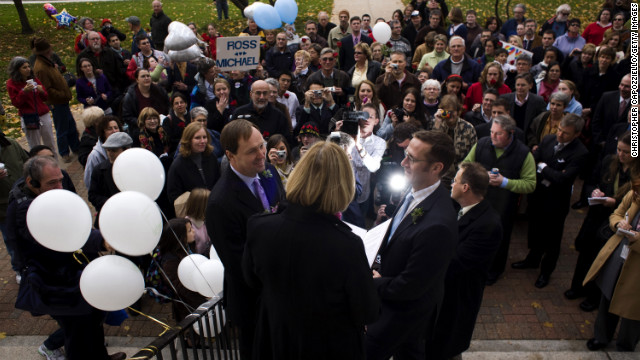 Michael Miller, left, and Ross Zachs marry on the West Hartford Town Hall steps after same-sex marriages became legal in Connecticut on November 12, 2008.
Michael Miller, left, and Ross Zachs marry on the West Hartford Town Hall steps after same-sex marriages became legal in Connecticut on November 12, 2008. 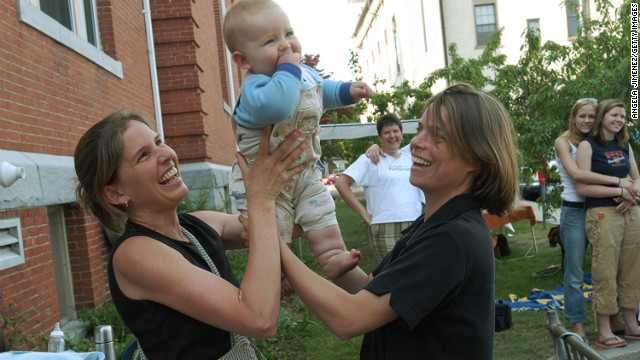 Lara Ramsey, left, and her partner of eight years, Jane Lohmann, play with their 7-month-old son, Wyatt Ramsey-Lohmann. The two wed in 2004 after Massachusetts approved same-sex marriage. Massachusetts was the first state in the U.S. to do so.
Lara Ramsey, left, and her partner of eight years, Jane Lohmann, play with their 7-month-old son, Wyatt Ramsey-Lohmann. The two wed in 2004 after Massachusetts approved same-sex marriage. Massachusetts was the first state in the U.S. to do so. Same-sex marriage in U.S.
Same-sex marriage in U.S.
Same-sex marriage in U.S.
Same-sex marriage in U.S.
Same-sex marriage in U.S.
Same-sex marriage in U.S.
Same-sex marriage in U.S.
Same-sex marriage in U.S.
Same-sex marriage in U.S.
Same-sex marriage in U.S.
Same-sex marriage in U.S.
Same-sex marriage in U.S.
Same-sex marriage in U.S.
Same-sex marriage in U.S.
Same-sex marriage in U.S.
Same-sex marriage in U.S.
Same-sex marriage in U.S.
Same-sex marriage in U.S.
Same-sex marriage in U.S.
Same-sex marriage in U.S.
Same-sex marriage in U.S.
Same-sex marriage in U.S.
Same-sex marriage in U.S.
Same-sex marriage in U.S.
Same-sex marriage in U.S.
 Photos: Same-sex marriage in U.S.
Photos: Same-sex marriage in U.S. "Since the lawsuit was filed last year, we have received so much support from so many people in our state, and we are now looking forward to the day when we will finally be married," he said.
The legal, social, and political conversation over expanding the definition of marriage that is playing out in Utah is by no means unique, but merely another thread of an issue that is being confronted in courtrooms and living rooms nationwide.
Same-sex marriage is legal in the District of Columbia and 19 states: California, Connecticut, Delaware, Hawaii, Illinois, Iowa, Maine, Maryland, Massachusetts, Minnesota, New Hampshire, New Jersey, New Mexico, New York, Oregon, Pennsylvania, Rhode Island, Vermont, and Washington. Massachusetts was the first to make it legal, in 2004.
A recent Williams Institute survey found that among metro areas with a population above 1 million, Salt Lake City had the nation's highest rate of same-sex couples raising children, at 26%. Virginia Beach, Detroit, Memphis and San Antonio were not far behind. Among states, Mississippi led the list, also at 26%.
When it was passed in 2004, Utah's Prop 3, which banned same-sex marriage, had 66% voter support. But that has since fallen. A Salt Lake City Tribune poll has found residents there equally divided on whether same-sex couples should be allowed to get state-issued marriage licenses.
Unclear is whether the Utah appeals court decision would also apply to the other five states within its jurisdiction in the Midwest and Mountain West. Oklahoma's same-sex marriage ban was also before it.
Enforcement of the Utah ruling was also stayed to give the state time to explore its legal options. It means same-sex couples in Utah cannot get married for the time being.
But in the meantime, Hillary Hall, clerk and recorder for Boulder County, Colorado, said Wednesday that she would begin issuing same-sex marriage licenses.
"Because the Court stayed its mandate, officials in Utah will not have to implement the decision immediately. Even so, I believe the opinion is clear and it is important to act immediately.
"Colorado's prohibition on same-sex marriage has treated our family, friends and co-workers as second class citizens for long enough. Unless a Court in Colorado or the U.S. Supreme Court tells me otherwise, I plan to begin issuing licenses," she said in a statement.
Colorado's attorney general stressed that the state's prohibition on same-sex marriages remains in effect. In his statement, John Suthers said that any marriage licenses issued to such couples before a final resolution would be invalid.
"There might be a bump in the road along the way ... The state may challenge this," said Tracey MacDermott, who married her partner of 18 years on Wednesday.
Standing beside their license, she added: "I think this will actually mean what it says it means down the road," CNN affiliate KUSA reported.
Wednesday's decision also spells further legal limbo for 1,300 Utah couples who were legally wed when a federal judge first struck down the state's ban in late December. Those marriage licenses were issued for a 17-day period before the Supreme Court agreed with Utah officials to temporarily halt further marriages while the issue was appealed.
Utah's senior senator, Orrin Hatch, a Republican, expressed disappointment in Wednesday's ruling.
"Although I am not surprised by today's decision, I disagree with the court's reasoning and hope the Supreme Court ultimately adheres to the original understanding of the Constitution and allows each state to define marriage for itself," said Hatch.
But lawyers for the three same-sex couples who first filed the lawsuit challenging Utah's ban said the issue was simple.
"If you boil it down from all of the legal rhetoric, it really comes down to fundamental principles of equality and fairness," said Peggy Tomsic, a Salt Lake City attorney who argued the case before the appeals court. "I am genuinely hopeful that the Supreme Court will take this case and resolve this issue and declare it's unconstitutional."
The Utah decision and one by a federal district judge in Indiana striking down that state's ban, came a year and a day after notable Supreme Court rulings on the issue.
A 5-4 majority struck down a federal law known as the Defense of Marriage Act, which had denied legally married same-sex couples the same federal benefits, including tax breaks, available to heterosexual couples.
The court, also 5-4, dismissed a same-sex marriage appeal on jurisdictional grounds, ruling that private parties do not have "standing" to defend California's voter-approved ballot measure barring gay and lesbian couples from state-sanctioned wedlock. The ruling cleared the way for same-sex marriages there to resume.
No comments:
Post a Comment